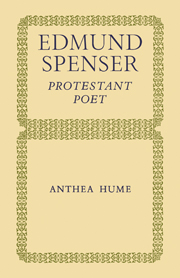6 - Books II–VI: From Virtue to Virtue
Published online by Cambridge University Press: 18 February 2010
Summary
In presenting with creative zest as many aspects as he could encompass of human moral, emotional and social experience in Books II to vi of The Faerie Queene, Spenser drew on the full range of his eclectic reading. Pagan books and Protestant tracts both proved valuable to him, as did the Renaissance treatises on ‘the Ethicke part of Morall Philosophic’. These latter works, of which Giovanni Battista Giraldi's or Pierre de la Primaudaye's will serve as examples, expounded the moral virtues with frequent and even-handed reference to Aristotle and Christ, Plato and St Augustine, Pythagoras, Democritus, Seneca, Cicero and St Ambrose. A late sixteenthcentury poet who chose to ‘fashion a gentleman or noble person in vertuous and gentle discipline’ could turn if he wished to copious stores of ancient and modern thought on the subject.
The Renaissance ethical handbooks certainly made their contribution to The Faerie Queene. The division of Book II, for example, into two sections exploring the irascible and concupiscible passions respectively, with the opening of Canto vi acting as a watershed (‘A Harder lesson, to learne Continence / In ioyous pleasure, then in grieuous paine’), relies on a distinction which goes back to the Republic, Book ix, and can be found in Giraldi's discussion, among others. Similarly, the linking or pairing of virtues within particular episodes often follows a lead provided by the handbooks, as is the case when Guyon's special affinity with Shamefastness is discovered at the Castle of Alma.
- Type
- Chapter
- Information
- Edmund SpenserProtestant Poet, pp. 107 - 144Publisher: Cambridge University PressPrint publication year: 1984



